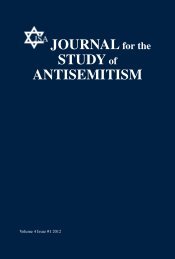JOURNALfor the STUDYof ANTISEMITISM
JOURNALfor the STUDYof ANTISEMITISM
JOURNALfor the STUDYof ANTISEMITISM
You also want an ePaper? Increase the reach of your titles
YUMPU automatically turns print PDFs into web optimized ePapers that Google loves.
282 JOURNAL FOR THE STUDY OF <strong>ANTISEMITISM</strong> [ VOL. 3:281<br />
Not <strong>the</strong> Final Word,” weaves over <strong>the</strong> factual history, using all of <strong>the</strong> information<br />
in <strong>the</strong> book to help us to understand <strong>the</strong> editors’ hypo<strong>the</strong>sis: that we<br />
are only in <strong>the</strong> second century of <strong>the</strong> new face of antisemitism, not just<br />
hatred of <strong>the</strong> Jews, but an era of death and destruction to <strong>the</strong> Jews. In his<br />
summary, Levy notes that since <strong>the</strong> end of <strong>the</strong> 18th century, certain people<br />
have moved from “Jew-hatred, Jew-baiting, and Judeo-phobia and <strong>the</strong>ir permutations<br />
and o<strong>the</strong>r prejudices to anti-Jewish actions.” Prior to <strong>the</strong> last century,<br />
“persecution, especially in violent forms, had been episodic ra<strong>the</strong>r than<br />
continuous, and long periods of European history yielded no evidence of<br />
anti-Jewish violence.” The editors note that <strong>the</strong> “fantasy of enormous Jewish<br />
power became <strong>the</strong> position of enough individuals to float a movement.”<br />
Prior to this, Augustine had taught that “Jews should go on living but that<br />
<strong>the</strong>ir debased condition was fitting testimony to <strong>the</strong> superiority of Christian<br />
faith.” In <strong>the</strong> last 200 years, however, Jews thriving and triumphant ra<strong>the</strong>r<br />
than suffering and subservient violated a culturally embedded expectation.<br />
Jews are now to be feared, not just hated.<br />
The body of <strong>the</strong> pieces begins with two chapters entitled “The Jewish<br />
Question,” by Albert S. Lindemann; and “The Ancient Mediterranean and<br />
<strong>the</strong> Pre-Christian Era,” by Benjamin Isaac, Lessing Professor of Ancient<br />
History, Tel Aviv University, and ends with two chapters entitled<br />
“Antisemitism in Eastern Europe (excluding Russia and <strong>the</strong> Soviet Empire)<br />
Since 1848,” by Istvan Deak, Seth Low Professor of History emeritus,<br />
Columbia University; and “Israel and Antisemitism,” by Meir Litvak, associate<br />
professor of Middle Eastern history, Tel Aviv University, and Es<strong>the</strong>r<br />
Webman, senior research fellow, Dayan Center for Middle Eastern and<br />
African Studies, and <strong>the</strong> Stephen Roth Institute for <strong>the</strong> Study of Antisemitism<br />
and Racism.<br />
The 15 middle chapters open with <strong>the</strong> following quote in Chapter 3,<br />
“Jews and Christians from <strong>the</strong> Time of Christ to Constantine’s Reign,” by<br />
Philip A. Cunningham, professor of <strong>the</strong>ology and director of <strong>the</strong> Institute<br />
for Jewish-Catholic Relations, St. Joseph’s University, Philadelphia: “It is a<br />
widely held belief that Judaism and Christianity became separate and fundamentally<br />
opposed religious communities shortly after <strong>the</strong> lifetime of<br />
Jesus,” teaching <strong>the</strong> history of <strong>the</strong> world from an antisemitic perspective.<br />
Lindemann and Levy wonder what, perhaps, <strong>the</strong> Jews had done to<br />
deserve <strong>the</strong>ir special status as <strong>the</strong> eternal scapegoat, but had no convincing,<br />
valid explanation for it; indeed, given <strong>the</strong> present level of anti-Jewish, anti-<br />
Zionistic, and antisemitic feelings among <strong>the</strong> billion Muslim voices, <strong>the</strong>y<br />
despair in <strong>the</strong> conclusion to <strong>the</strong> book—although <strong>the</strong>y recognize that it is not<br />
<strong>the</strong> final word—that “It is difficult to believe that antisemitism will anytime<br />
soon be overcome.”<br />
This book could ei<strong>the</strong>r be used in <strong>the</strong> classroom, or serve, as it did for














